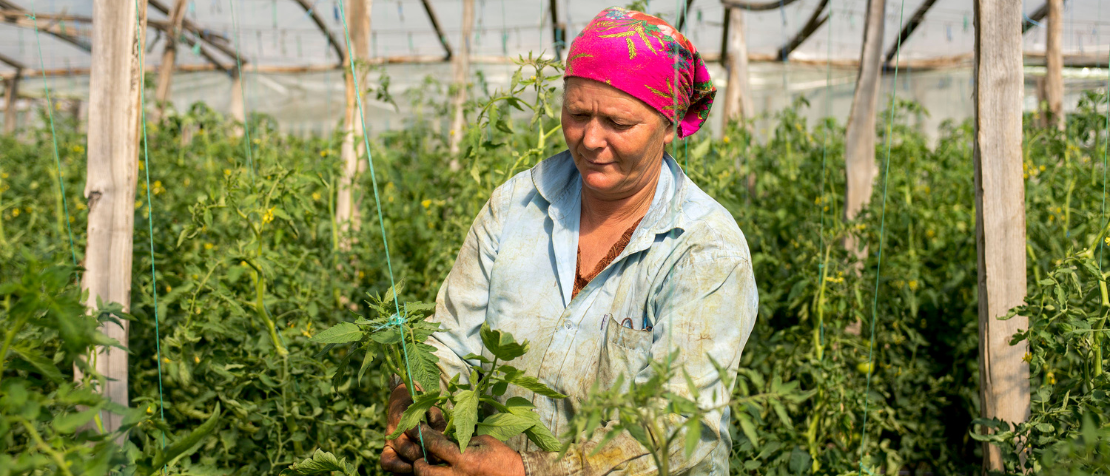More emergency relief for Moldovan farmers

©FAO/Dorin Goian
The Food and Agriculture Organization of the United Nations (FAO) in the Republic of Moldova, in collaboration with the Austrian Development Agency (ADA), the operational unit of Austrian Development Cooperation, the Government of Japan and the Government of Switzerland, has initiated a new phase of emergency agricultural assistance for vulnerable smallholder farmers and households struggling with the effects of the 2022 drought and the ongoing regional crisis.
In the spring of 2024, 622 rural communities will receive essential agricultural resources such as vegetable seed kits, seed potato tubers, and cattle fodder. The inputs, which are valued at almost USD 1 million, are financed by two projects implemented by FAO:
1. The joint initiative by FAO and the United Nations Development Programme (UNDP) “Emergency support for agri-producers in the context of socio-economic and energy crisis”, funded by ADA and the Swiss Government through the Republic of Moldova 2030 Sustainable Development Goals Partnerships Trust Fund.
2. The FAO project “Emergency support to sustain agricultural production and safeguard the food and nutrition security of highly vulnerable farming households impacted by the conflict in Ukraine and drought”, funded by the Government of Japan.
Highlighting the dire need for cattle feed, Tudor Robu, FAO Assistant Representative in the Republic of Moldova, stated, “this assistance is crucial for the vulnerable families that rely on their livestock for their basic food needs.” To this end, nearly 2 500 individual beneficiaries owning from one to five cows will receive 400 kg of compound animal feed, providing a lifeline until the new pasturing season begins.
The initiative will reach 12 000 pre-selected vulnerable beneficiaries in critical need of support. Eight rayons will receive vegetable seed kits distribution: Soroca, Hincesti, Orhei, Cantemir, Riscani, Floresti, Edinet, and Drochia. Five rayons will receive potato seeds: Orhei, Cantemir, Stefan Voda, Edinet, and Riscani; and four rayons will receive animal feed: Cimislia, Falesti, Stefan Voda, and Soldanesti.
The vegetable seed kits will be distributed in February, at the beginning of the planting season. Designed for small-scale operations, each kit supports vegetable production under plastic tunnels ranging from 50 to 1 000 m² and includes a selection of tomato and cucumber seeds, fertilizer for drip irrigation, pheromone diffusers, and cell trays for seedling production. Additionally, in spring 2024, nearly 8 000 households will receive each 50 kg of seed potato tubers, sufficient to cover a 200 m² area.
“Austrian Development Cooperation is deeply committed to alleviating the difficulties faced by Moldovan farmers and rural households. Our collaboration with the Republic of Moldova and international bodies like FAO and UNDP showcases our dedication to promote sustainable development and food security in our partner country," affirmed Gunther Zimmer, Head of the Austrian Development Agency’s office in Chișinău.
The Swiss Cooperation Office in Republic of Moldova also expressed its commitment. Head of Office, Guido Beltrani stated that "this project is fully in line with our long-standing commitment to support Republic of Moldova's development and resilience. With this contribution in particular, the Swiss Government contributes to food security in the region and helps mitigate the negative impacts of the current military conflict in Ukraine by supporting the most vulnerable farmers in rural areas, especially women and young farmers.”
Showing strong support for Republic of Moldova during tough times, Japan’s Ambassador to the Republic of Moldova, Yoichiro Yamada highlighted that "this assistance embodies Japan's solidarity with Republic of Moldova during these difficult times, and we are committed to supporting Republic of Moldova's journey towards recovery and sustainable development. We are confident that through collaboration with FAO and other stakeholders, we can achieve impactful outcomes for the Moldovan people."
Vladimir Bolea, Minister of Agriculture and Food Industry in Republic of Moldova, commended the initiative. “We are grateful for the support of our international partners in addressing the urgent needs of vulnerable families. This program is a testament to our continued commitment to mitigating the effects of current challenges facing the agriculture sector, particularly the smallholder farmers.”
In addition to agricultural inputs distribution, FAO will train farmers in climate-smart agriculture technologies and practical income-generating activities, with a target of inclusion of nearly 200 women agricultural producers. This comprehensive approach not only addresses immediate agricultural needs but also fosters long-term sustainability and market access.
------------------------------------------------------------
Since the start of the FAO’s Rapid Response Plan in 2023, in collaboration with ADA, Switzerland and Japan, substantial assistance has been provided to the agricultural community in the Republic of Moldova, targeting families and farmers facing economic hardships and the adverse effects of climate change. Specifically, cattle fodder was distributed to 2 830 families from 120 localities across the districts of Căușeni, Basarabeasca, Cahul, Cantemir, and Leova. Each family received between 350 and 375 kg of fodder, which was vital in addressing existing feed shortages. Furthermore, the program facilitated the distribution of 30 tonnes of maize seeds and 60 tonnes of fertilizers to more than 1 200 small farmers in the three districts of Călărași, Râșcani, and Cantemir.
According to the estimates of the Government of the Republic of Moldova, Russia’s war in Ukraine could cost the economy of the Republic of Moldova two to ten percent of the country's total GDP. At the same time, 70 percent of the Republic of Moldova’s small farms already suffer from a lack of resources, inputs, and arid weather conditions.
